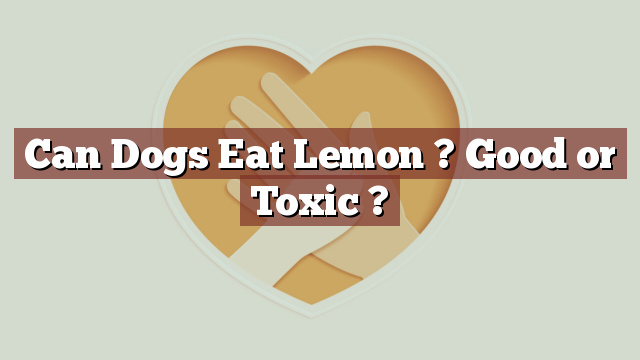Can Dogs Eat Lemon? Good or Toxic?
As responsible pet owners, it is crucial to be aware of what foods are safe for our furry friends. In this article, we will be answering the question: can dogs eat lemon? We will explore the nutritional value of lemons, the safety concerns surrounding their consumption, potential risks and benefits, and what to do if your dog happens to eat a lemon.
Nutritional Value of Lemons for Dogs
Lemons are rich in various vitamins and minerals that are beneficial for humans, but what about dogs? Lemons contain vitamin C, vitamin B6, vitamin A, potassium, calcium, and folate. These nutrients are essential for a healthy immune system, bone development, and overall well-being. However, it is important to note that dogs have different dietary requirements compared to humans.
Can Dogs Eat Lemon: Is it Safe or Toxic for Them?
While lemons are not inherently toxic to dogs, it is generally advised to avoid feeding them to our canine companions. The reason behind this caution is the high acidity of lemons, which can cause stomach upset and digestive issues in dogs. Additionally, the essential oils found in lemons, mainly limonene and linalool, can be toxic to dogs in large quantities.
Scientific and veterinary insights suggest that the consumption of lemons should be limited or avoided altogether. Dogs have more sensitive digestive systems than humans, and their bodies may not tolerate the acidity of lemons as well. Regular ingestion of lemons may lead to gastrointestinal discomfort, vomiting, diarrhea, or even pancreatitis in severe cases.
Potential Risks and Benefits of Dogs Consuming Lemon
While lemons pose potential risks to dogs, there are also some reported benefits associated with their consumption. Some pet owners claim that lemons can act as a natural flea and tick repellent. However, it is crucial to note that the use of lemon as a repellent should be done under the guidance of a veterinarian, as the concentration and application method can greatly affect its effectiveness and safety.
On the other hand, the potential risks of dogs consuming lemons outweigh the benefits. The risk of digestive upset and potential toxicity make it advisable to avoid feeding lemons to dogs altogether.
What to Do If Your Dog Eats Lemon
If your dog accidentally consumes lemons or any food containing lemon, it is important to monitor their behavior for any signs of distress. Keep an eye out for symptoms such as vomiting, diarrhea, abdominal pain, or loss of appetite. If these symptoms persist or worsen, it is crucial to seek veterinary advice.
In case of accidental ingestion of lemon essential oils, it is important to contact a veterinarian immediately. Symptoms of essential oil toxicity can include drooling, difficulty breathing, weakness, tremors, or even seizures. Prompt medical attention is necessary to ensure the well-being of your dog.
Conclusion: Should Dogs Eat Lemons or Not?
In conclusion, while lemons contain certain beneficial nutrients, they are not recommended as a part of a dog’s regular diet. The high acidity and potential toxicity of lemons can lead to digestive issues and other health problems in dogs. It is best to err on the side of caution and avoid feeding lemons to your furry companions. If you have any concerns or questions about your dog’s diet, it is always wise to consult with a veterinarian who can provide professional guidance tailored to your dog’s specific needs.
Thank you for investing your time in exploring [page_title] on Can-Eat.org. Our goal is to provide readers like you with thorough and reliable information about various dietary topics. Each article, including [page_title], stems from diligent research and a passion for understanding the nuances of our food choices. We believe that knowledge is a vital step towards making informed and healthy decisions. However, while "[page_title]" sheds light on its specific topic, it's crucial to remember that everyone's body reacts differently to foods and dietary changes. What might be beneficial for one person could have different effects on another. Before you consider integrating suggestions or insights from "[page_title]" into your diet, it's always wise to consult with a nutritionist or healthcare professional. Their specialized knowledge ensures that you're making choices best suited to your individual health needs. As you navigate [page_title], be mindful of potential allergies, intolerances, or unique dietary requirements you may have. No singular article can capture the vast diversity of human health, and individualized guidance is invaluable. The content provided in [page_title] serves as a general guide. It is not, by any means, a substitute for personalized medical or nutritional advice. Your health should always be the top priority, and professional guidance is the best path forward. In your journey towards a balanced and nutritious lifestyle, we hope that [page_title] serves as a helpful stepping stone. Remember, informed decisions lead to healthier outcomes. Thank you for trusting Can-Eat.org. Continue exploring, learning, and prioritizing your health. Cheers to a well-informed and healthier future!

